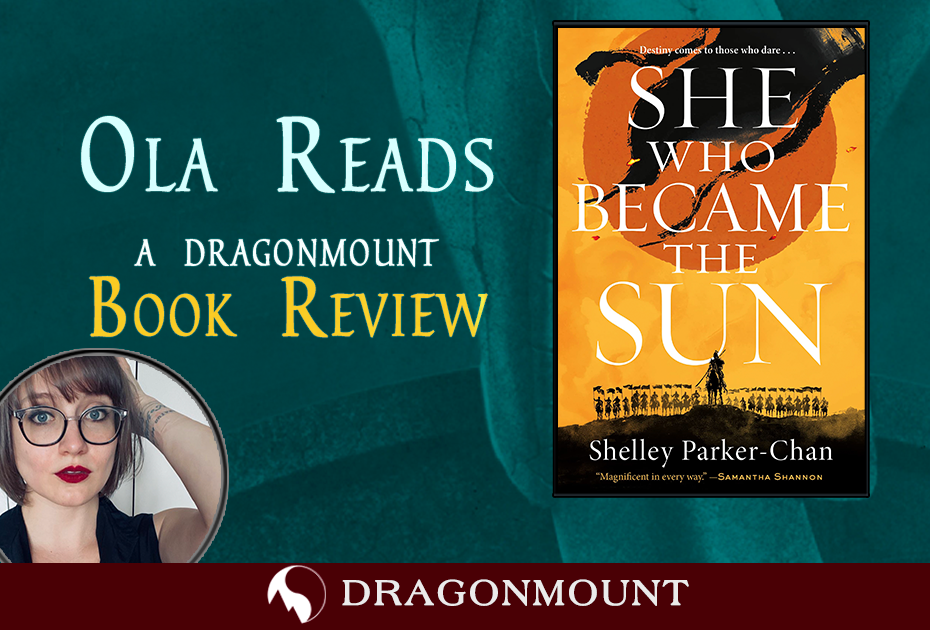
Aleksandra (Ola) Hill is a Polish-Canadian writer and the founder and editor-in-chief of khōréō, a magazine of speculative fiction by immigrant and diaspora writers. She won the grand prize in the 2019 Writer’s Digest Popular Fiction Awards and is currently pursuing an MFA in writing at The New School. You can find her on Twitter at @_aleksandrahill.
#
TL;DR: She Who Became the Sun by Shelley Parker-Chan is a glorious first book in an epic historical fantasy duology. Set in 14th-century China, it brings to mind Mulan crossed with A Song of Ice and Fire. It’s perfect for fans of political intrigue, war, and a main character who strives for glory—whatever it takes.
#
Destiny isn’t exactly a new theme in literature. Prophecies frequently figured into Greek tragedies and have been used heavily in fantasy since then, including about half a dozen different ones appearing in our beloved Wheel of Time series. Characters learning about and fulfilling their destinies, or working to “change their stars”, are common enough to risk being cliches.
What I haven’t seen as much of is characters literally taking someone else’s destiny for their own.
She Who Became the Sun begins with a girl, her brother, her father, and the starving village where they live. A local fortune teller tells the brother that greatness is in his future: that “his deeds will bring a hundred generations of pride to the family name.”
For the girl, he sees… nothing. Just nothingness.
And so, when her brother dies, she takes his fate for herself. Zhu, known only as ‘the girl’ until the moment she begins using her brother’s name, leaves the village to join a monastery as a novice using his identity and her own tenacity. Yet even climbing within the ranks of the monks proves to be insufficient to guarantee Zhu’s safety and comfort when the outside world forces its way into the monastery—and so we embark upon Zhu’s true journey towards (possible) greatness.
The historical setting of the novel is particularly brimming with opportunity. Taking place in 1345, when China is under Mongolian rule, the book explores two interlinked concepts of political philosophy: tiānmìng, the Mandate of Heaven, which provides the right to rule; and the Right of Rebellion, which provides moral ground for overthrowing an unjust ruler (I’ll take this opportunity to note that I’m neither a philosopher, nor political scientist, nor a scholar of Chinese history; I beg the forgiveness of those who are better versed in these subjects for any gross oversimplification!). At the beginning of the book, a descendant of Kublai Khan holds power and thus the Mandate of Heaven. While Zhu is the main character of the novel, the reader is also able to dive into a number of different points of view in the second part of the novel, including two on the Mongolian side. The first of these, Esen, is a prince and a rising star of the court thanks to Ouyang, who is a famed general, eunuch, and Esen’s best friend. Through their eyes, we see not only the Mongolians’ battle to retain power versus the rebelling Chinese, but also the smaller power struggles within a cutthroat court.
On the rebel’s side, we see the world through Zhu’s eyes, as well as those of Ma, an young woman with no family who is betrothed to a rebel leader’s bumbling, inept son. While, as a reader, one naturally sides with the rebels clearly living under an oppressive rule, their own faction is rife with the same issues that plague the party in power: unchecked ambition, betrayal, and greed.
The struggle for power is enriched by one of the themes running through the novel: that of identity, especially in light of gender, sex, and relationships. For one, Zhu is born a woman and lives as a man, yet gender has not—in my reading—been of particular import to them except as a tool, even though it matters so much to the society that they live in. Their relationship with Ma, who is ensnared by society in her identity as a woman, provides an additional layer of depth to Zhu’s character that had me riveted to the page. In addition, Ouyang provides a strong counterpoint and foil to Zhu’s on views of gender by his status as a eunuch, especially in light of his relationship to Esen, a man who has never had to question his identity or place in the world. In contrast, Ouyang is held in contempt by the court, considered a sort of in-between thing rather than a man. These facets of identity play off of each other, deepening the tension and raising the stakes for every scene.
Importantly, this may not be an epic fantasy series in the way that readers of Jordan, Sanderson, Bardugo, and Jemisin might think of it. Specifically, there is no magic system of weaves or elements or spells; nor are there mythological creatures. Rather, the fantasy (if, indeed, it is fantasy*) comes from the personification of the Mandate of Heaven and the unquestionable existence of destiny, as well as the existence of (ancestral) ghosts. Some characters can see the dead, for example; in addition, the Mandate of Heaven is clearly visible to individuals. Zhu can also feel Heaven’s eyes on them, especially if they act outside of the character of Zhu.
*Writing this as a non-religious Polish-Canadian scientist/writer, the existence of something like Heaven, fate, and ancestral spirits are fantasy to me—but they may be very real to others.
This may be a different feeling to fantasy for many, especially when thinking of epic fantasy. There is no magic school and no focus on harnessing supernatural power in ways that you might expect. However, I never felt anything but enchanted by the world that Parker-Chan has created, both from the beauty of their writing and the sheer immenseness of the history that they have chosen to reimagine, and that’s everything that I’ve ever wanted from fantasy. Daes Dae’mar and battles like Dumai’s Wells were integral to The Wheel of Time—as are the politics and battles in this book.
She Who Became the Sun swallowed me whole from the very first page and didn’t let go until I emerged, blinking into the sunlight and slightly disoriented, at the end of the story. I was enthralled by Zhu as a highly flawed protagonist, enraptured by Esen and Ouyang, and enamored of Ma. Most of all, I love how unapologetically queer this book is and how deeply it explores love, sex, and gender against a truly epic backdrop. It’s one of my favourite books of the year, but I particularly recommend it to those who love political and military fantasy, alternative history, queer fantasy, and flawed protagonists.
-Dragonmount-Banner-Ads-1200x280.gif.ed90097d91aa5c65a5c17fab3b59c6f2.gif)
-Dragonmount-Banner-Ads-728x90.gif.a2f99d762ad611c51fbffc8b25a4efb4.gif)
-Dragonmount-Banner-Ads-320x100.gif.a233f9b759ce2a0c82ee7b9e890e85dd.gif)








.jpg.b7a8ed0c6c6b6db6eaa89411a06d40a5.jpg)
.gif.42a259ec4461f639cc9bc78adbc6ff0e.gif)
Recommended Comments
There are no comments to display.
Join the conversation
You can post now and register later. If you have an account, sign in now to post with your account.
Note: Your post will require moderator approval before it will be visible.